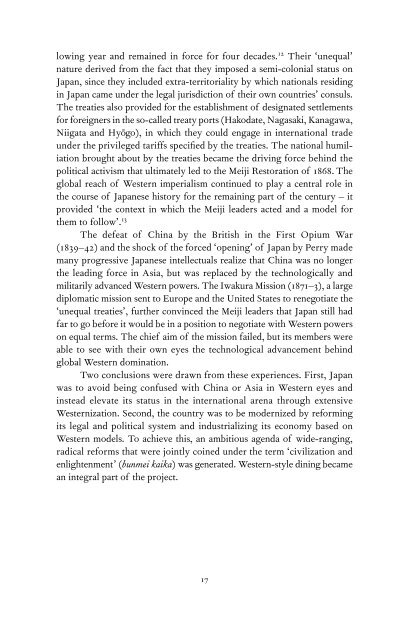- Page 1: Modern Japanese Cuisine Food, Power
- Page 5 and 6: Modern Japanese Cuisine Food, Power
- Page 7: Contents Introduction 7 1 Western F
- Page 10 and 11: A contemporary home meal. (Chikuzen
- Page 12 and 13: multiculturalism in contemporary Ja
- Page 14 and 15: themselves experts on it. They all
- Page 16 and 17: entremets Pudding à la Diplomate M
- Page 20 and 21: Eating for ‘Civilization and Enli
- Page 22 and 23: the daily life of the Palace at all
- Page 24 and 25: The new faces, the old historical n
- Page 26 and 27: was to become the crucial strategy
- Page 28 and 29: concern ‘to preserve draft animal
- Page 30 and 31: various types of meat indicates tha
- Page 32 and 33: Westerners slaughtering and butcher
- Page 34 and 35: Japanese enjoying beef stew, from K
- Page 36 and 37: of the meat-eating taboo fitted per
- Page 38 and 39: Foreign settlement house in Yokoham
- Page 40 and 41: My health is miserable, my appetite
- Page 42 and 43: Dining-room of the Grand Hotel in Y
- Page 44 and 45: William Gray Dixon (1854-1928), who
- Page 46 and 47: opened in 1863, may have been prece
- Page 48 and 49: Prices of set menus at top Western-
- Page 50 and 51: Poached eggs Omelettes Beefsteak Co
- Page 52 and 53: uilding blocks for the new dining s
- Page 54 and 55: Lunch room at the Takashimaya depar
- Page 56 and 57: interconnectedness between food-pro
- Page 58 and 59: Three Strengthening the Military Fa
- Page 60 and 61: further inhibited their diffusion.
- Page 62 and 63: the hope of increasing sales, Ichit
- Page 64 and 65: in Meiji Japan. Yanagisawa Sakichi
- Page 66 and 67: dwarfish - too small, in fact, for
- Page 68 and 69:
quo, by discarding the prevailing p
- Page 70 and 71:
usually consisted of a bowl of rice
- Page 72 and 73:
Modernizing Military Catering Berib
- Page 74 and 75:
availability of foodstuffs. Moreove
- Page 76 and 77:
Fried rice Boiled rice and barley s
- Page 78 and 79:
were easiest to procure on location
- Page 80 and 81:
in the military was also far above
- Page 82 and 83:
division (and its location) Imperia
- Page 84 and 85:
homogenizing effect of industrially
- Page 86 and 87:
Conscripts at table, 1938. new tast
- Page 88 and 89:
Soldiers preparing rice balls, 1937
- Page 90 and 91:
Although serving the interests of t
- Page 92 and 93:
‘A Page from the Accounting Book
- Page 94 and 95:
A middle-class family at dinner, a
- Page 96 and 97:
An urban working family at a shared
- Page 98 and 99:
An issue of the magazine Fujin zass
- Page 100 and 101:
ecame a standard sight at Western-i
- Page 102 and 103:
they affected the cooking practices
- Page 104 and 105:
to try new recipes and made homemak
- Page 106 and 107:
A weekly menu (side dishes to be se
- Page 108 and 109:
An array of methods was employed by
- Page 110 and 111:
were sweet azuki bean soup with mil
- Page 112 and 113:
The style is known nowadays under t
- Page 114 and 115:
However, the principles of beauty o
- Page 116 and 117:
Japanese home cookery for future ge
- Page 118 and 119:
City dwellers planting vegetables b
- Page 120 and 121:
The ‘Rising Sun Lunch Box’ (Hin
- Page 122 and 123:
conscription made modern nation sta
- Page 124 and 125:
made public on a daily basis by the
- Page 126 and 127:
menus - were propagated as an examp
- Page 128 and 129:
Ship’s biscuits factory, c. 1940s
- Page 130 and 131:
than rice (which became increasingl
- Page 132 and 133:
In the long run, the wartime ration
- Page 134 and 135:
Wartime communal cooking provided a
- Page 136 and 137:
Defeat: Japan in the Wake of World
- Page 138 and 139:
1955 Eiyō no seirigaku [Physiology
- Page 140 and 141:
Six The Culinary Consequences of Ja
- Page 142 and 143:
hishio, is recorded to have been us
- Page 144 and 145:
A Chinese servant waiting on Wester
- Page 146 and 147:
Chinatown restaurant. Only a handfu
- Page 148 and 149:
A typical rāmen restaurant in rura
- Page 150 and 151:
kyōkasho (‘Catering Textbook for
- Page 152 and 153:
was supplied, largely illegally, by
- Page 154 and 155:
historically embedded than is gener
- Page 156 and 157:
Kimch’i production in Japan, 1980
- Page 158 and 159:
Seven Multiple Circuits of Affluenc
- Page 160 and 161:
School lunch centred on bread and m
- Page 162 and 163:
The emergence of a consumer market
- Page 164 and 165:
the catering departments of each sc
- Page 166 and 167:
Japan’s school lunch program, whi
- Page 168 and 169:
of the most powerful mechanisms of
- Page 170 and 171:
A kiosk with food souvenirs is indi
- Page 172 and 173:
fact that it began to offer to thei
- Page 174 and 175:
One of the characteristic features
- Page 176 and 177:
Home Buddhist altar with offerings
- Page 178 and 179:
mixture of old and new, with clear
- Page 180 and 181:
ather works as the basic social bon
- Page 182 and 183:
processes. Examining the strategies
- Page 184 and 185:
the sugar plantations of Hawai’i,
- Page 186 and 187:
‘Local’ sushi varieties of the
- Page 188 and 189:
Benihana restaurants operate a sush
- Page 190 and 191:
plate in front of you, chopped up i
- Page 192 and 193:
their enterprises a financial boost
- Page 194 and 195:
The late Hara Yōichi, the owner of
- Page 196 and 197:
obots in sushi making, and that in
- Page 198 and 199:
Yo!Sushi outlet on the concourse of
- Page 200 and 201:
A Wagamama menu, 2005.
- Page 202 and 203:
References Introduction 1 Michael A
- Page 204 and 205:
6 Ōhama and Yoshihara, Edo, Tōky
- Page 206 and 207:
54 John Mertz, Novel Japanese: Spac
- Page 208 and 209:
kigen, pp. 74, 80. 35 Basil H. Cham
- Page 210 and 211:
A Research Review, ed. H. J. Teuteb
- Page 212 and 213:
Kinenkai, ed., Sūji de miru Nihon
- Page 214 and 215:
Japan,, pp. 65, 93. 10 Sand, House
- Page 216 and 217:
61 Kumakura Isao, ‘Tea and Japan
- Page 218 and 219:
19 Imada Setsuko, ‘Dainiji sekai
- Page 220 and 221:
5 Noguchi Hokugen, ‘Shokumotsu ch
- Page 222 and 223:
also Chōsen Sōtokufu Shokusankyok
- Page 224 and 225:
Shokuryō Shinbunsha (Tokyo, 1990),
- Page 226 and 227:
ed. K. J. Cwiertka with B.C.A. Walr
- Page 228 and 229:
Japan: The Experience of Japan’s
- Page 230 and 231:
Glossary agemono ‘deep-fried dish
- Page 232 and 233:
with a variety of fillings and roll
- Page 234 and 235:
mirin and sugar: before being eaten
- Page 236 and 237:
Marianne Lien and Brigitte Nerlich,
- Page 238 and 239:
Agricultural Experiment Stations 58
- Page 240 and 241:
hotels, Western-style 39-40 Fujiya
- Page 242:
First Opium 17 Korean 136, 156, 187







